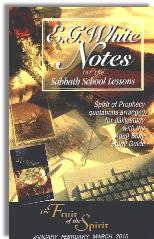|
||||||||||||||
Commentary on "The Fruit of the Spirit is Kindness"
Day 5: Wednesday, February 3, 2010
Overview
On Wednesday we are introduced to the theme of kindness returned. It brings to our attention Jesus' words from the Sermon on the Mount about receiving what we give to others, either positive or negative, either love or condemnation. Still, we are manifesting our true Christian character, especially when we don't experience in return the kindness we share with them.
Observations
The impression given by the author is that he interpreted Jesus' words' "give, and it will be given to you" to refer to horizontal human relationships. Conspicuously absent is the vertical relationship with God. This absence is surprising, because in the context, the motivation for being kind with those who are not responding with the same measure is to be godly, like God, who gives good gifts even to those who are hating him (Luke 6:35,36).
We are told to do good "expecting nothing in return" (v. 35), but our author interprets "give, and it will be given to you" (v.38) as a promise of an opposite outcome: do good and expect good. He admits that this is not always the case, proving that he is realistic, but he misses Jesus' point in asking his listeners to expect nothing in return yet asserting, "and your reward will be great" (v.35). It becomes clear that Jesus is asking us to expect nothing in return from those whom we are supposed to love unconditionally, but he promises us a reward—something from Him—in return. This reward will be not from people but from Somebody else, "and you will be sons of the Most High, for he is kind to the ungrateful and the evil. Be merciful, even as your Father is merciful. Judge not, and you will not be judged; condemn not, and you will not be condemned; forgive, and you will be forgiven; give, and it will be given to you. Good measure, pressed down, shaken together, running over, will be put into your lap. For with the measure you use it will be measured back to you.” (Luke 6:35-38)
It becomes clear that the reward spoken here comes from another Source, not human, but divine—not from people but from God. This promise reflects the Lord's Prayer, which is a part of the same sermon on the Mount, even if it is found in Matthew 6: "[F]orgive us our debts, as we also have forgiven our debtors." At the human level this promise is a reflection of God's love and forgiveness replicated in the Son's life. In Luke we are told that as we bless others, we will receive more and more, perhaps also in order to bless our neighbors more and more.
By restricting himself exclusively to human relationships, the author misses the mark, and his interpretation of the text is contradictory. He robs his readers of the benefit for being motivated to be kind to others because of God's greater love and kindness, his inexhaustible grace that every morning is fresh and keeps us on the right track. The supernatural work of the Holy Spirit who dwells and fills the believer according to Christ's promises is not in view. At this moment, perhaps its time to ask the author if indeed his intention is to present kindness as a true gift of the Holy Spirit, or if it is something that operates outside God's grace and its sanctifying power.
Summary
- The Bible does not give us a mandate to expect tangible rewards now in exchange for kindness.
- God does promise to reward us for our deeds done in the Spirit for His kingdom.
- Kindness as a portion of the fruit of the Spirit is never a human-to-human phenomenon.
- Kindness is a gift of God in that we receive His kindness in forgiving us and making us alive by His Spirit—and then He extends His own kindness through our regenerated hearts to others.
- True kindness originates in God and spreads from Him to us and thus to others when He indwells us.
GO TO DAY 6
Copyright 2010 BibleStudiesForAdventists.com. All rights reserved. Revised February 2, 2010. This website is published by Life Assurance Ministries, Glendale, Arizona, USA, the publisher of Proclamation! Magazine. Contact email: BibleStudiesForAdventists@gmail.com.
The Sabbath School Bible Study Guide and the corresponding E.G. White Notes are published by Pacific Press Publishing Association, which is owned and operated by the Seventh-day Adventist church. The current quarter's editions are pictured above.
Official Adventist Resources
Standard Edition Study Guide Week 6
Teacher's Edition Study Guide Week 6
Easy Reading Edition Study Guide Week 6
Search the Complete Published Ellen G. White Writings


